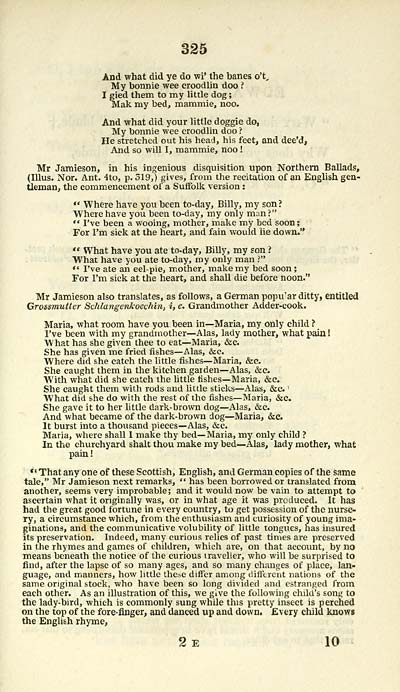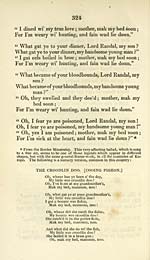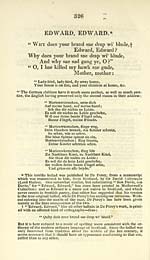Glen Collection of printed music > Printed text > Scottish ballads
(349) Page 325
Download files
Complete book:
Individual page:
Thumbnail gallery: Grid view | List view

325
And what did ye do wi' the banes o't.
My bonnie wee croodlin doo ?
I gied them to my little dog ;
Mak my bed, mammie, nco.
And what did your little doggie do,
My bonnie wee croodlin doo ?
He stretched out his head, his feet, and dee'd,
And so will I, mammie, noo !
Mr Jamieson, in his ingenious disquisition upon Northern Ballads,
(Illus. Nor. Ant. 4to, p. 319,) gives, from the recitation of an English gen-
tleman, the commencement of a Suffolk version :
«* Where have you been to-day, Billy, my son?
Where have you been to-day, my only man?"
*• I've been a wooing, mother, make my bed soon ;
For I'm sick at the heart, and fain would lie down."
" What have you ate to-day, Billy, my son ?
What have you ate to-day, my only man ?"
" I've ate an eel-pie, mother, inake my bed soon ;
For I'm sick at the heart, and shall die before noon."
Mr Jamieson also translates, as follows, a German popular ditty, entitled
Grossmutter Schlangenkoechin, i, e. Grandmother Adder-cook.
Maria, what room have you been in— Maria, my only child ?
I've been with my grandmother — Alas, lady mother, what pain !
What has she given thee to eat— Maria, &c.
She has given me fried fishes— Alas, &c.
Where did she catch the little fishes- Maria, &c.
She caught them in the kitchen garden — Alas, &c.
With what did she catch the little fishes— Maria, &c.
She caught them with rods and little sticks — Alas, &c. '
What did she do with the rest of the fishes— Maria, &c.
She gave it to her httle dark-brown dog— Alas, &c.
And what became of the dark-brown dog— Maria, &c.
It burst into a thousand pieces— Alas, &c.
Maria, where shall I make thy bed— Maria, my only child ?
In the churchyard shalt thou make my bed— Alas, lady mother, what
pain!
*' That any one of these Scottish, English, and German copies of the same
tale," Mr Jamieson next remarks, •• has been borrowed or translated from
another, seems very improbable; and it would now be vain to attempt to
ascertain what it originally was, or in what age it was produced. It has
had the great good fortune in every country, to get possession of the nurse-
ry, a circumstance which, from the enthusiasm and curiosity of young ima-
ginations, and the communicative volubility of little tongues, has insured
its preservation. Indeed, many curious relics of past times are preserved
in the rhymes and games of children, which are, on that account, by no
means beneath the notice of the curious traveller, who will be surprised to
find, after the lapse of so many ages, and so many changes of place, lan-
guage, and nrjauners, how little the»e differ among different nations of the
same original stock, who have been so long divided and estranged from
each other. As an illustration of this, we give the following child's song to
the lady-bird, which is commonly sung while this pretty insect is perched
on the top of the fore-finger, and danced up and down. Every child knows
the English rhyme,
2 E 10
And what did ye do wi' the banes o't.
My bonnie wee croodlin doo ?
I gied them to my little dog ;
Mak my bed, mammie, nco.
And what did your little doggie do,
My bonnie wee croodlin doo ?
He stretched out his head, his feet, and dee'd,
And so will I, mammie, noo !
Mr Jamieson, in his ingenious disquisition upon Northern Ballads,
(Illus. Nor. Ant. 4to, p. 319,) gives, from the recitation of an English gen-
tleman, the commencement of a Suffolk version :
«* Where have you been to-day, Billy, my son?
Where have you been to-day, my only man?"
*• I've been a wooing, mother, make my bed soon ;
For I'm sick at the heart, and fain would lie down."
" What have you ate to-day, Billy, my son ?
What have you ate to-day, my only man ?"
" I've ate an eel-pie, mother, inake my bed soon ;
For I'm sick at the heart, and shall die before noon."
Mr Jamieson also translates, as follows, a German popular ditty, entitled
Grossmutter Schlangenkoechin, i, e. Grandmother Adder-cook.
Maria, what room have you been in— Maria, my only child ?
I've been with my grandmother — Alas, lady mother, what pain !
What has she given thee to eat— Maria, &c.
She has given me fried fishes— Alas, &c.
Where did she catch the little fishes- Maria, &c.
She caught them in the kitchen garden — Alas, &c.
With what did she catch the little fishes— Maria, &c.
She caught them with rods and little sticks — Alas, &c. '
What did she do with the rest of the fishes— Maria, &c.
She gave it to her httle dark-brown dog— Alas, &c.
And what became of the dark-brown dog— Maria, &c.
It burst into a thousand pieces— Alas, &c.
Maria, where shall I make thy bed— Maria, my only child ?
In the churchyard shalt thou make my bed— Alas, lady mother, what
pain!
*' That any one of these Scottish, English, and German copies of the same
tale," Mr Jamieson next remarks, •• has been borrowed or translated from
another, seems very improbable; and it would now be vain to attempt to
ascertain what it originally was, or in what age it was produced. It has
had the great good fortune in every country, to get possession of the nurse-
ry, a circumstance which, from the enthusiasm and curiosity of young ima-
ginations, and the communicative volubility of little tongues, has insured
its preservation. Indeed, many curious relics of past times are preserved
in the rhymes and games of children, which are, on that account, by no
means beneath the notice of the curious traveller, who will be surprised to
find, after the lapse of so many ages, and so many changes of place, lan-
guage, and nrjauners, how little the»e differ among different nations of the
same original stock, who have been so long divided and estranged from
each other. As an illustration of this, we give the following child's song to
the lady-bird, which is commonly sung while this pretty insect is perched
on the top of the fore-finger, and danced up and down. Every child knows
the English rhyme,
2 E 10
Set display mode to: Large image | Transcription
Images and transcriptions on this page, including medium image downloads, may be used under the Creative Commons Attribution 4.0 International Licence unless otherwise stated. ![]()
| Special collections of printed music > Glen Collection of printed music > Printed text > Scottish ballads > (349) Page 325 |
|---|
| Permanent URL | https://digital.nls.uk/87742165 |
|---|
| Description | Scottish songs and music of the 18th and early 19th centuries, including music for the Highland bagpipe. These are selected items from the collection of John Glen (1833 to 1904). Also includes a few manuscripts, some treatises, and other books on the subject. |
|---|
| Description | The Glen Collection and the Inglis Collection represent mainly 18th and 19th century Scottish music, including Scottish songs. The collections of Berlioz and Verdi collected by bibliographer Cecil Hopkinson contain contemporary and later editions of the works of the two composers Berlioz and Verdi. |
|---|

